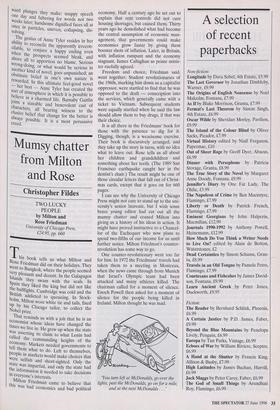Mumsy chatter from Milton and Rose
Christopher Fildes
This book tells us what Milton and Rose Friedman did on their holidays. They went to Bangkok, where the people seemed very pleasant and decent. In the Galapagos Islands they swam with the seals. In Spain they liked the king but did not like the bullfights. Cambridge was cold and the British addicted to queueing. In Stock- holm, Milton wore white tie and tails, fixed up by his Chicago tailor, to collect the Nobel prize. That reminds us with a jolt that he is an economist whose ideas have changed the times we live in. He grew up when the state was asserting its claim to what Lenin had called the commanding heights of the economy. Markets needed governments to tell them what to do. Left to themselves, people in markets would make choices that were selfish and short-sighted. Only the state was impartial, and only the state had the information it needed to take decisions in everyone's interests. Milton Friedman came to believe that this was bad economics and bad political economy. Half a century ago he set out to explain that rent controls did not cure housing shortages, but caused them. Thirty years ago he demolished what had become the central assumption of economic man- agement, that governments could make economies grow faster by giving them booster shots of inflation. Later, in Britain, with inflation rampant and the economy stagnant, James Callaghan as prime minis- ter ruefully agreed.
Freedom and choice, Friedman said, went together. Student revolutionaries of the 1960s, marking him down as a capitalist oppressor, were startled to find that he was opposed to the draft — conscription into the services, which generally came with a ticket to Vietnam. Subsequent students were equally startled when he said the law should allow them to buy drugs, if that was their choice.
It is all there in the Friedmans' book for those with the patience to dig for it. Digging, though, is a wearisome exercise. Their book is discursively arranged, and they take up the story in turns, with no idea what to leave out. Rose tells us all about her children and grandchildren and something about her teeth. (The 1989 San Francisco earthquake caught her in the dentist's chair.) The result might be one of those circular letters that fall out of Christ- mas cards, except that it goes on for 660 pages.
I can see why the University of Chicago Press might not care to stand up to the uni- versity's senior laureate, but I wish some brave young editor had cut out all the mumsy chatter and coaxed Milton into giving us a history of his ideas in action. It might have proved instructive to a Chancel- lor of the Exchequer who now plans to spend two-fifths of our income for us until further notice. Milton Friedman's counter- revolution has some way to go.
One counter-revolutionary went too far for him. In 1972 the Friedmans' travels had taken them to a meeting in Montreux, when the news came through from Munich that Israel's Olympic team had been attacked and many athletes killed. The chairman called for a moment of silence. Enoch Powell then asked for a moment of silence for the people being killed in Ireland. Milton thought he was mad.
You turn left at McDonalds, go over the lights, past the McDonalds, go on for a mile, and at the next McDonalds . .


























































 Previous page
Previous page